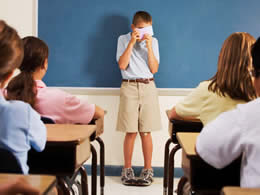Stress disorders in children and adolescents. All about stress in children. Discover the guide of stress for children and adolescents. Success to reduce stress in children and college. Stress in children.
What is Stress in Children?
While some
stress is normal and even healthy, children today seem to encounter many stressful life events at earlier ages. Stress shows itself in children by complaints about stomachaches, being nervous, trouble sleeping, anger flares, and infections.
Stress is a life event or situation that causes imbalance in an individual’s life. An unhealthy response to stress occurs when the demands of the stressor exceed an individual’s coping ability. Often stress results from something that is beyond our control. Control has a great deal to do with levels of stress.
Helping Children Cope With Stress
Some stress is normal in children and adolescents
Some stress is normal. Daily and life challenges can be expected. For example, most children will attend school and will have to go through many transitions. Most adolescents will have to grapple with their sense of identity to determine where they “fit”. Being afraid of the dark and feeling peer pressure are predictable stressors. Other stressors are not as predictable. Disruptions to what is considered normal for the child cause problems with stress. Small amounts of stress, as experienced before a test or when meeting new people, are necessary to present challenges for greater learning. Simple stress experienced when learning a new skill or playing an exciting game raise a person’s level of excitement or pressure above the normal level.
Take now the free
children stress test: Is my child stressed out?
When is Stress Distress?
Problems begin when ordinary stress becomes too much stress or distress
There are a variety of reasons for children to feel stress. Death, divorce, remarriage, moving, long illness, abuse, family or community violence, natural disaster, fear of failure, and cultural conflict may each heighten stress. Under stress, the heart rate and breathing are at a higher speed and muscles are tense. Multiple stressors worsen the stress level and the length of the stress. Our bodies need relief from stress to reestablish balance.
Children’s Reactions to Stress
Reactions to stress vary with the child’s stage of development, ability to cope, the length of time the stressor continues, intensity of the stressor, and the degree of support from family, friends, and community. The two most frequent indicators that children are stressed are change in behaviors and regression of behaviors. Children under stress change their behavior and react by doing things that are not in keeping with their usual style. Behaviors seen in earlier phases of development, such as thumb sucking and regression in toileting, may reap-pear.
Typical Symptoms of Stress for Children
Preschoolers
Typically, preschoolers lack self-control, have no sense of time, act independently, are curious, may wet the bed, have changes in eating habits, have difficulty with sleep or speech, and cannot tell adults how they are feeling.
Preschoolers under stress each react differently. Some behaviors may include irritability, anxiety, uncontrollable crying, trembling with fright, eating or sleep problems. Toddlers may regress to infant behaviors, feel angry and not understand their feelings, fear being alone or without their parent, withdraw, bite, or be sensitive to sudden or loud noises. Feelings of sadness or anger may build inside of them. They may become angry or aggressive, have nightmares, or be accident prone.
Elementary-age Children
Typical elementary-age children can whine when things don’t go their way, be aggressive, question adults, try out new behaviors, complain about school, have fears and nightmares, and lose concentration.
Reactions to stress may include withdrawal, feelings of being unloved, being distrustful, not attending to school or friendships, and having difficulty naming their feelings. Under stress, they may worry about the future, complain of head or stomachaches, have trouble sleeping, have a loss of appetite, or need to urinate frequently.
Preteens and Adolescents
Adolescents typically are rebellious, have “growing” pains and skin problems, may have sleep disturbances, may go off by themselves, be agitated, and act irresponsibly.
Adolescents and teens under stress may feel angry longer, feel disillusioned, lack self-esteem, and have a general distrust of the world. Sometimes adolescents will show extreme behaviors ranging from doing everything they are asked, to rebelling and breaking all of the rules and taking part in high-risk behaviors (drugs, shoplifting, skipping school). Depression and suicidal tendencies are concerns.
Coping Strategies for Stress in Children
It is not necessary to be a therapist to help children cope with stress. One key element in reducing stress is a stress-free environment. A stress-free environment is based on social support, having the ability to find hope by thinking through solutions, and being able to anticipate stress and learn ways to avoid it.
Social Support
Social support means having people to lean on during difficult times. Parents who listen, friends to talk to, hugs, and help in thinking through solutions are ways children feel support.
Thinking It Through Clearly
Children must learn to think through a problem. Some specific strategies include self-talk, writing about the problem, and making a plan. Thinking positively and thinking up real solutions is important.
Foresee Stressful Situations and Avoid Them
If we can foresee an event, we can often block it as a stressor. Ignoring problems, changing the subject, not worrying about it, or changing an action can be coping strategies.
Conclusion: Stress in Children
As adults, we can make sure we don’t add to children’s stress by expecting them to act in adult ways. We can praise, be positive, seek positive solutions, help children name their feelings, teach fairness, help children learn to like themselves, be patient, teach honesty, and give lots of love and encouragement, particularly during difficult times.
Share this page with your friends:
Help your friends and family to know themselves better. Share this page, they will appreciate it... and all thanks to you! 100% stress advices and free tests :-)
